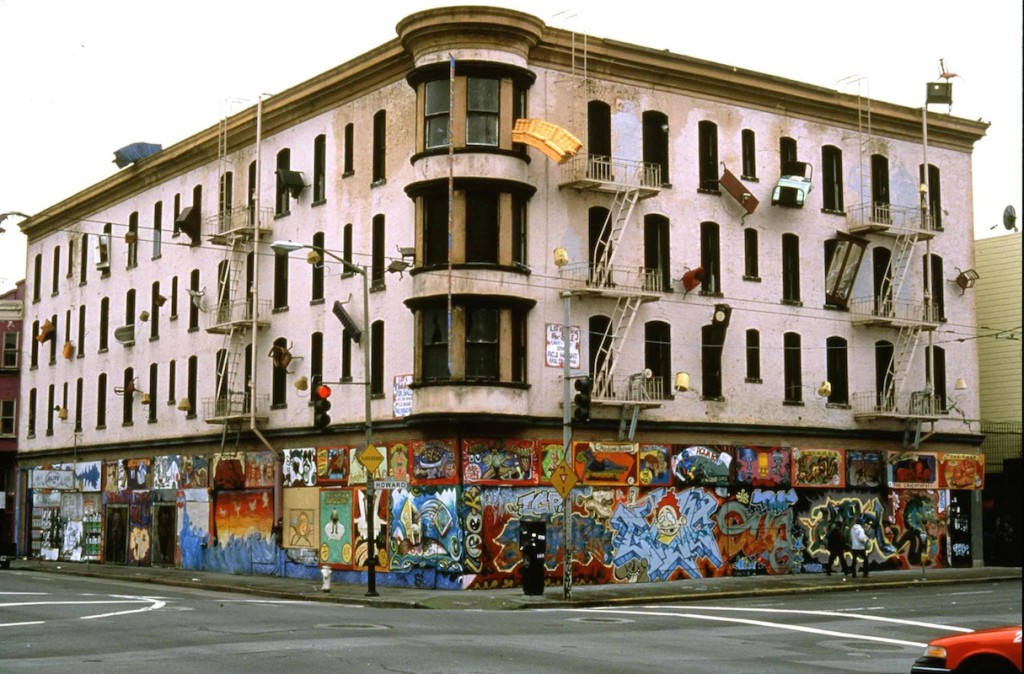
Defenestration. Against society’s expectations, these everyday objects flood out of windows like escapees, out onto available ledges, up and down the walls, onto the fire escapes and off the roof. San Francisco, California. 1997. Multi-disciplinary sculptural mural by Brian Goggin.
DEFENESTRATION OF DUTERTE AND DUTERTISMO
By Galileo de Guzman Castillo
You sit in power
A king on a rotten throne
You plunder our land
Reap the fruits you haven’t sown
—“Paper Tiger”, TUBAW Music Collective
Eight days before taking the helm in 2016, then President-elect Rodrigo Duterte warned that he will never tolerate even a whiff or whisper of corruption under his administration. Wanting to make good on his campaign promise, he ordered the Bureau of Internal Revenue (BIR), Bureau of Customs (BOC), and the Philippine National Police (PNP) to shape up and stamp out corruption among their ranks. Five years after his bold declaration to eliminate crime and corruption by the first six months of his term, Duterte admits that achieving “a pristine clean government is impossible,” adding that “every administration will have its share of the problem of corruption,” and “little did [he] know that [he] will be fighting [his] own government.”
Shenanigans and charades
With less than a year left in his presidency, he is faced with a noisome issue reeking from his government’s criminally incompetent and failed COVID-19 response. The Commission on Audit (COA) has flagged almost all nooks and crannies of the Duterte bureaucracy with various deficiencies, most prominently in the Department of Health’s (DOH) management of its ₱67.3-billion (~US$1.3 billion) funds for pandemic response. These include irregularities in the procurement process involving procedural deficiencies and lack of proper documentation, poor planning resulting in unutilized, unobligated, and inefficient utilization of funds, and noncompliance with pertinent laws and established regulations.
The COA report has prompted both Houses of Congress to investigate the anomalies, with some senators reiterating their earlier calls for the resignation of DOH Secretary Francisco Duque III who also came under fire for the corruption allegations that rocked the Philippine Health Insurance Corporation (PhilHealth) last year.
Defending his ever trusted health chief against the public backlash over the audit reports, Duterte suggested that COA continue its mandate but refrain from publishing findings, as doing so would taint agencies with “corruption by perception.” This came after the infamous meltdown (now turned into a popular meme) of a frustrated Duque blurting, “Winarak na ninyo kami eh. Winarak na ninyo ang dangal ng DOH.” (You’ve destroyed us. You’ve destroyed the honour of the DOH.)
With chinks already conspicuously appearing in the supposed tough stance on criminality and corruption, the chief executive further doubled down on his previous suggestion, going as far as declaring, “I will stand for Duque even if it [brings] me down.” Duterte then ordered the COA—notwithstanding it being an independent constitutional body that is only fulfilling its mandated function—to “reconfigure” its audit reports on government agencies by immediately saying there are no irregularities involved.
Ironically, the desperate attempt to Photoshop the severely dented image of a supposed anti-corruption crusader backfired. It only exposed Duterte and his government for what they truly are: a massive fraud.
The administration’s hypersensitivity to criticism has only further galvanized support for the audit body among the public and private sector, with several business groups, universities, and non-government organizations banding together to defend the COA. Therewithal, it has also strengthened public scrutiny and oversight on the proposed ₱5.024 trillion (~US$100.5 billion) budget for 2022 transmitted to Congress by the Department of Budget and Management (DBM), itself riddled with controversies.
The supposed COVID-19 response and recovery budget glaringly reflects the misplaced agenda of the Duterte administration. In particular, the government has allocated ₱1.18 trillion (~US$23.6 billion) or almost a quarter of the entire budget for infrastructure projects purportedly to drive the economic recovery from the pandemic recession, instead of augmenting the budget for social amelioration and protection and funding direct relief measures.
Even more egregious are the questionable appropriations to the security sector even as the country grapples with the rise in Delta variant cases and hospitals reaching critical thresholds for capacity and staffing. A whopping ₱28.1 billion (~US$562.4 million) was allocated to the National Task Force to End Local Communist Armed Conflict (NTF-ELCAC), an agency under the Office of the President (OP) that has engaged in the red-tagging of activists and dissidents. An additional ₱4.5 billion (~US$90.1 million) in “intelligence” and “confidential” funds was lodged under the OP constituting more than half of its proposed ₱8.2 billion (~US$164.1 million) budget.
These insertions were regarded with suspicion by opposition groups as tell-tale buttressing of an election war chest and blatant use of state machinery and resources to further tighten Duterte’s grip on power.
Meanwhile, the executive slashed funds meant for the University of the Philippines (UP) that currently administers the country’s biggest COVID-19 referral centre, the Philippine General Hospital (PGH). The Research Institute for Tropical Medicine (RITM) also received budget cuts despite being the country’s main coronavirus testing centre.
At the same time, overworked and underpaid health workers—many on the brink of mass resignation—have had to protest repeatedly to demand the release of delayed COVID-19 benefits. These include their special risk allowance, hazard pay, and other compensation benefits stipulated under the Bayanihan to Recover as One Act or Bayanihan 2, a law enacted in 2020 that expired last June 2021.
The grand corruption
These have been the hallmark of the Duterte administration’s COVID-19 response: heavy-handed, militarized, and marred with corruption. And no amount of crushed dolomite dumped on the shoreline of Manila Bay to “beautify” and turn it into a white sand beach can disguise the pervasive, odious corruption—perceived or real. Instead, corruption in this administration has gone beyond just damaging the public coffers.
Beyond the nauseating and headline-grabbing malodour of corruption wafting from every crevice of the Duterte regime, what harm—apparent and obscure—have actually been inflicted upon the nation over the years?
Duterte, the political maverick that he is, has not only altered the political landscape and permutation of the country. His moribund presidency has also insidiously spread defilements all over the political, economic, social, and cultural dimensions of the polity.
In architecture, there is such a thing as “fenestration” referring to the arrangement, proportioning, and design of windows and doors in a building. The way Duterte has structured and designed his government and the political economy of Dutertismo has ensured that many doors and windows would be installed as conduits of corruption—free-flowing and unabated— with a rotten throne in Malacañang Palace, decomposed and surrounded by a putrid, corrupt, and festering political cesspool.
He has not only stood up all this time for his Health Secretary Duque, under fire from all sides; Duterte has also defended two of his close subordinates over controversies hounding the government’s pandemic spending: ex-Budget Undersecretary Lloyd Christopher Lao, a fraternity brother who had served as one of his volunteer election lawyers in 2016, and former presidential economic adviser Michael Yang, a Chinese businessman linked to Pharmally, a pharmaceutical corporation implicated in the anomalous multi-billion COVID-19 contracts for medical goods, test kits, and personal protective equipment (PPE).
As questions of corruption links came to the fore, the name of Duterte’s close personal aide, now Senator Christopher Bong Go, has also come up in the probes for his connections to the embattled Lao, who worked as an undersecretary in Go’s former office as Special Assistant to the President. In 2019, having been appointed chief executive officer and commissioner of the Housing and Land Use Regulatory Board (HLURB), Lao was subject of a complaint filed with the Presidential Anti-Corruption Commission (PACC) over accusations of operating an extortion racket. Despite this, he was next appointed officer-in-charge of the Procurement Service of the Budget Department (PS-DBM) in 2020, now undergoing Congressional investigation.
Irked by the gradual shedding of light on the controversial appointments and the corrupt ties that bind, Duterte ranted during his recorded public address, “Anong masama kung magbayad ako ng utang?” (What’s wrong if I pay my debts?) and vowed to “extract” government officials should they be cited in contempt for their contumacious refusal to answer pertinent questions before the Senate Blue Ribbon Committee.
The political architecture and culture of the Duterte regime is steeped in corruption and clientelism. Government agencies have been adulterated with inept political appointees, recycled corrupt officials, and “social media specialists” that spout disinformation and vacuous drivel. Cronyism and nepotism remain entrenched in the ethos of the Duterte era, underpinned by political “utang na loob” (debt of gratitude) and quid pro quo adopted from decades of local warlord governance in Davao City and applied at a national scale.
The President of the Philippines, upon entering office, makes an oath or affirmation to preserve and defend the Constitution. On the contrary, Duterte has only bastardized the Constitution as he sees himself above anyone and anything, including the Supreme Law of the country.
He has persistently disrespected the separation of powers among the government’s co-equal branches and undermined the independent constitutional commissions and institutions. With his thirst for power and fixation on forever wars—on drugs, on corruption, on communist insurgency—he has perverted the justice system and brazenly flouted the rule of law.
But the corruption did not stop here.
He has also subverted democratic institutions and eroded civil liberties and fundamental human rights in all their facets, including economic, social, and cultural rights. Dutertenomics has only weakened the economy and further entrenched neoliberalism and deepened inequality, with “Filipino elites and agencies driving the implementation process” of infrastructure and development projects at the expense of the environment and local communities, as political economist Alvin Camba chronicles.
The commander-in-chief has suborned the military and police to become pawns to dispense brutality and death, and spread a culture of fear and impunity in our communities. He has continually degraded women, normalized and legitimized patriarchy, and reinforced gender oppression with his sexism and machismo.
He has tainted cultural values and debauched the morals of the people and endeavoured to corrupt all branches of the government. Duterte, the Grand Corruptor, has debased not only the office of Philippine presidency; the stench of corruption has permeated almost all, if not all facets of our democracy.
Trifecta of fenestrations
The general elections next year could provide at the very least an opportunity for regime change—however inadequate that may be for some, as it may not address the structural and systemic issues at play. A nagging question remains for those who are tired of the same old political games of elites and celebrities and a broken electoral system hijacked by the rich and powerful: How to deal with the exigencies of the present political realities that cannot be responded to with more of the same?
A month ago, Duterte opened his sixth and last State of the Nation Address (SONA) pronouncing, “Today as I approach the end of my term, I have less visions but more remembrances. But mine is not to rue or to second guess what might have been, but to bear and respond with urgency [to the impact] of unforeseen events as they unfold.”
One month after delivering his SONA, Duterte accepted the nomination of his discordant political party to run for Vice President in May 2022. According to the Cusi faction of PDP-Laban, Duterte “agreed to make the sacrifice and heed the clamour of the people.” And a few days ago, in his “Talk to the People” on television, the populist demagogue trumpeted, “I will [audit the COA] if I become Vice President. I will be the one to audit all government agencies, including mine.”
Ignoring the usual hypocritical bravado, what can be gleaned from this attempt at pandering, bordering on gaslighting that had become part and parcel of the Duterte style of leadership? Perhaps the question is not “Can we survive another six years of Duterte?” More importantly, what needs to be asked is “How do we stop the rot before it takes hold completely?”
A crucial task at hand is to dismantle the architecture of Duterte’s regime of swashbuckling façade and chaotic fenestration.
In the first sense, we build “fenestration lines.” We reunite the fragmentation and build from the grassroots a broad progressive movement fuelled by intergenerational, intersectional, and class solidarity. Similar to the structural adaptation of plants native to arid climates, the leaf windows manifest their colourful and diverse patterns: continuous, variegated, reticulated, and spotted. The fenestration lines allow the entry of light into the interior surfaces to harness energies, while providing protection from the desiccant winds of tyranny and oppression.
In the second sense, we conduct a “fenestration operation.” We cut an opening to replace the dysfunctional and failed Dutertismo, while breaking the cycle of pinning all hopes on Messianic personae whose names and narratives are cast in the same mould. We pave the way toward more radical change and systemic transformation.
In the third sense, we construct a “peoples’ fenestration.” We create with our own hands the arrangement, proportioning, and design of doors, windows, and structures of a post-Duterte Philippines. As we heal from the collective trauma of the COVID-19 pandemic and the malignant legacies of the Duterte regime, we recover, reimagine, and rebuild from the ground up, cementing the foundations of our nation.
These we do as we tread the path towards a more deliberative democracy—the “free circulation of contesting discourses that allows societies to be sensitive to good reasons,” as sociologist Nicole Curato describes—perhaps still staggering under the aberration and distorted realities of Dutertismo, but progressively moving forward nonetheless.
________
#Duterte and the Damage Done is a series of opinion pieces from Focus staffers in the Philippines reflecting on key concerns that underscore the damage that the Duterte administration has inflicted on the nation.

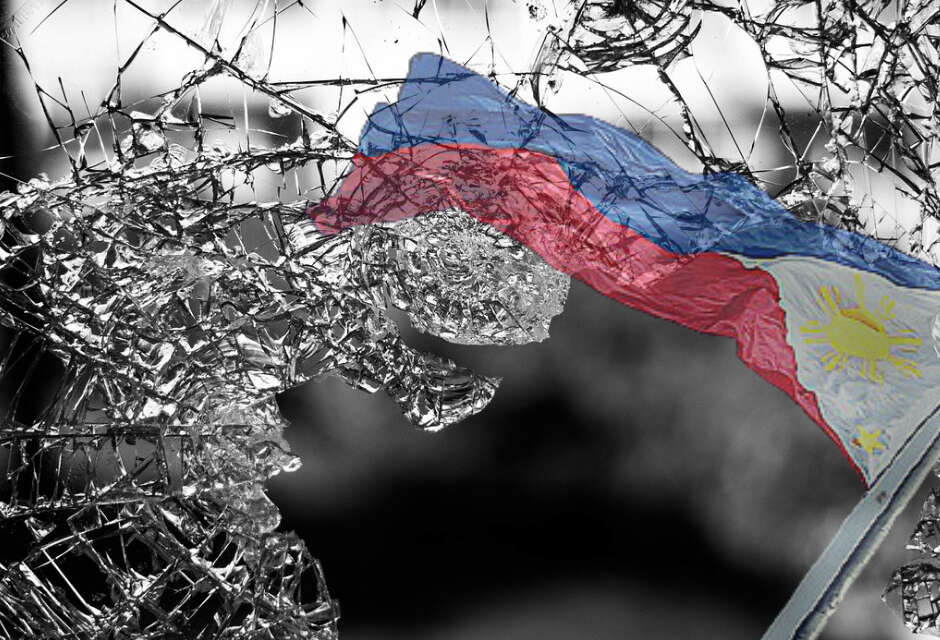
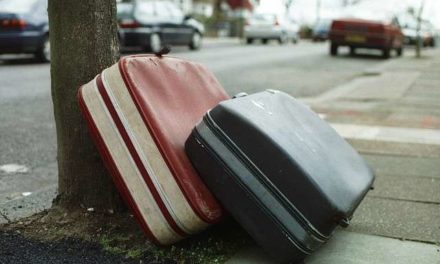
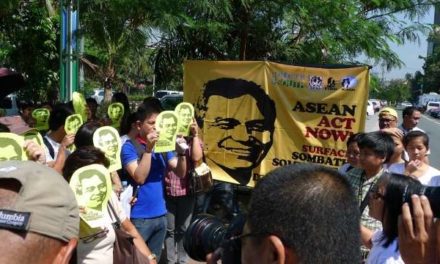
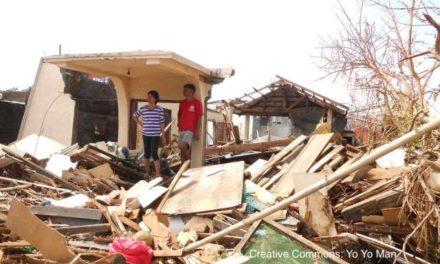



![[IN PHOTOS] In Defense of Human Rights and Dignity Movement (iDEFEND) Mobilization on the fourth State of the Nation Address (SONA) of Ferdinand Marcos, Jr.](https://focusweb.org/wp-content/uploads/2025/07/1-150x150.jpg)

